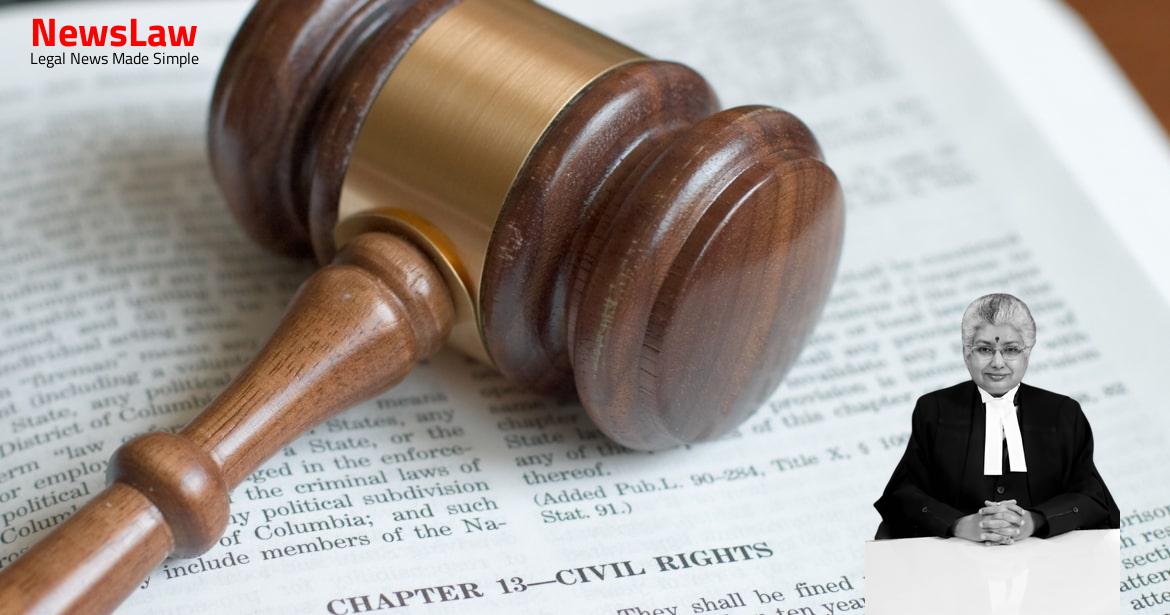In a recent legal case involving allegations of abetment of suicide, the High Court’s thorough legal analysis sheds light on the intricacies of the law. Examining the essence of abetment as defined in Section 306 of the IPC, the court’s ruling and considerations provide valuable insights into the complexity of such cases. Dive into this summary to understand the significance of legal scrutiny in matters of abetment of suicide.
Facts
- The deceased lodged a complaint with the police on 6 December 2016, citing threats from the accused and his association with illegal wealth amassment.
- On 6 December 2016, the deceased was found dead in a lodge room, with a suicide note implicating the accused in various illegal activities.
- The suicide note detailed the accused’s illegal acquisitions, fund transfers, and threats the deceased faced, leading to suicide.
- The accused was arrested on 11 December 2016 following the incident.
- The suicide note detailed 21 transactions undertaken by the accused.
- The deceased did not provide details of threats administered by the accused, despite detailing transactions in the suicide note.
- An unnumbered paragraph in the suicide note mentioned a threat by the accused due to a cash shortage of Rs 8 lakhs.
- The deceased accused the individual of withholding his salary for three months.
- No material was found by the Government Pleader to corroborate the allegations in the suicide note.
- The petition was filed in April 2017 and remained pending for over three years with no corroborative material found during the investigation.
Also Read: Electoral Malpractices in Mayor Election
Issue
- The suicide note does not contain specific incriminating statements, only mentioning a vague threat from the accused.
- The complaint lacks details about the alleged threat or any previous complaints of threats from the accused.
- The allegation of demanding repayment of Rs 8 lakhs seems unsubstantiated, as the deceased’s claim of being deprived of wealth is questioned.
- There are no allegations of any suspicious acts by the accused around the time of death.
- The lack of evidence regarding the use of the deceased’s mobile banking facilities for fund transfers raises doubts.
- No evidence of a threat call to the deceased has been found.
- The deceased, being the only witness to the suicide note, cannot provide further information.
- It is unlikely that the deceased would not have shared any threats received with family or friends.
- The prosecution fails to provide any substantial evidence of the deceased’s possession of a significant amount of money, which could provide motive for suicide.
Also Read: Balancing Power and Transparency: Electoral Bonds Struck Down, Disclosure Mandated
Arguments
- The petitioner argued that the evidence on record does not conclusively prove the guilt of the accused beyond a reasonable doubt.
- They also contended that the prosecution failed to establish a clear motive for the accused to commit the crime.
- The petitioner further submitted that there were discrepancies in the testimonies of the witnesses, casting doubt on the reliability of their statements.
- Mr Sharan Thakur represented the respondent-accused during the submissions, emphasizing these points in the defense.
- Mr Mahesh Thakur and Mr V.N. Raghupathy argued in favor of not quashing the FIR as it would halt the investigation midstream, highlighting the seriousness of the allegations against the accused.
- The suicide note and complaints detailed harassment by the accused, indicating a case of abetment of suicide.
- The High Court’s interference in quashing the complaint was seen as premature as it delved into the veracity of allegations at a stage not meant for trial.
- The defense argued that the allegations fell short of establishing abetment as there was no clear instigation to suicide, and investigations did not produce incriminating evidence despite thorough scrutiny.
- Contradictions in the complainant’s version and lack of overt acts mentioned in the suicide note by the accused were pivotal points raised by the defense.
Also Read: Recall of Resolution Plan Approval: Legal Analysis
Analysis
- The High Court has exceeded its jurisdiction under Section 482 of the CrPC by delving into the sufficiency of evidence rather than determining if there is a prima facie case.
- The Single Judge’s assessment of the allegations in the FIR and suicide note without the benefit of an evidentiary record is beyond the scope of Section 482.
- The complaint and suicide note detail various allegations against the accused, making it unjustifiable to quash the FIR at this stage.
- The High Court’s order has obstructed the investigation process and ventured into the realm of trial proceedings.
- The High Court’s scrutiny of the investigation details while it was stayed, and its inference on the veracity of allegations are improper.
- The judgment diminishes the importance of mental health and behavioral variations, disregarding the complexity of human emotions and reactions.
- The role of the High Court at the Section 482 stage is to assess if the allegations sufficiently establish a prima facie case, not to conduct a trial or scrutinize evidence.
- The High Court, in exercise of its power under Section 482 of the CrPC to quash the FIR against the second respondent-accused, should have considered two tests: i) whether the allegations in the complaint prima facie constitute an offence, and ii) whether the allegations are so improbable that a prudent man would not conclude that there are sufficient grounds to proceed with the complaint.
- The essence of abetment as defined in Section 107 of the IPC involves instigating a person to do something or intentionally doing that thing by an act or illegal omission. This is crucial in cases of abetment of suicide under Section 306 of the IPC.
- The limits on the exercise of power under Section 482 CrPC for quashing the FIR were laid down by Justice Ratnavel Pandian in a specific case, highlighting the need for judicious application of this power.
- The observations made by the Single Judge in the present case, particularly regarding the deceased and the nature of suicide, have been critically assessed in light of previous judgments emphasizing sensitivities in such matters as discussed in the case of Ramesh Kumar v. State of Chhattisgarh.
- Allowing the investigation to proceed would lead to the revelation of material facts
- These facts would aid in the trial for the alleged offence against the second respondent
Decision
- The High Court stalled the investigation by granting an interim order of stay.
- The appeals were allowed and the impugned judgment and order of the Single Judge of the High Court of Karnataka dated 29 May 2020 were set aside.
- The petition for quashing the FIR instituted by the respondent-accused was dismissed.
- Pending application(s), if any, stand disposed of.
Case Title: MAHENDRA K C Vs. THE STATE OF KARNATAKA (2021 INSC 700)
Case Number: Crl.A. No.-001238-001238 / 2021



